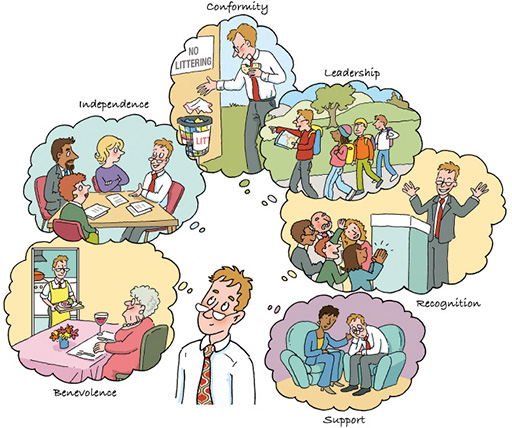3.1 Your values
Your values obviously have an important influence on what it is that you really want out of life and work. Again, your values will change as your circumstances change, so you need to reassess what's important to you on a regular basis.
To me, stating my values feels a little philosophical, but in essence, what I mean by values is those things that are important to you. For example, Coomber et al. set out a list of six values that they feel people should consider when thinking about a change of career (Figure 6):
- Benevolence Doing things for others
- Conformity Being accepted, doing what's socially correct
- Independence Making decisions, getting your own way
- Leadership Being in charge, having power and authority
- Recognition Being highly regarded and admired, having status, being important
- Support Being treated with understanding and consideration
(Coomber et al., 2002)
I don't expect you to relate to all the above values or consider them all to be important. Nor is the list exhaustive, by any means – you might feel that honesty, time to spend with your family, or particular moral or religious beliefs are most important to you, for example. However, the list is a good starting point from which to create your own personal goal statement.
Your mission statement should provide you with a focus around which you can begin to plan your career development goals. Now is a good time to do this, because otherwise these kind of values might be forgotten when you are planning your career and only become apparent once you are fully committed to an avenue. Of course, your values aren't mutually exclusive – although some will probably be more important to you than others at the present time – so you can combine several of them to come up with your statement. And remember, the things that are important to you in your career may not be the same things that you value most outside work.
So what does a mission statement look like? Here are some example statements to get you thinking.
To undertake world-class research in my field and disseminate my research and knowledge in an open and free manner.
To work in the area of engineering while rigorously maintaining my values with regard to environmental sustainability.
To incorporate my love of aviation into my working life.
To work in a flexible institution where I will be able to take time off in the week in exchange for working at the weekend.
To lead a team of people.
To make changes that improve people's lives, even if only a little bit.
Remember, your mission statement doesn't have to consist of a single sentence – you can put together two or three of these kind of statements to construct your overall statement.
Activity 10
Aim of this activity:
- to propose your personal mission statement.
In a learning log post, write your own personal mission statement. This shouldn't be more than two or three paragraphs. Try to include something you highlighted in Section 2 as being a strength of yours, as well as some of your personal values.

